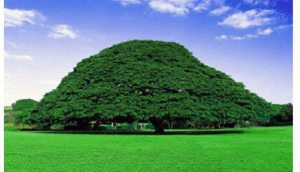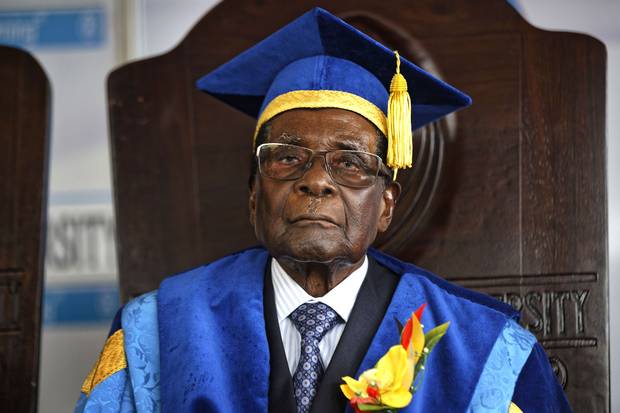In the end, it was the human weaknesses that proved the undoing of the world’s oldest dictator. Arrogance, pride, stubbornness and obsessive family loyalty – a mundane collection of ordinary frailties, but they were enough to bring down a ruler who had dominated Zimbabwe for 37 years.
The signs of a looming military coup must have been obvious to Robert Mugabe. His top generals were against his plan to give a senior government post to his unpopular wife, Grace. The once-petty feud between her and the commanders was growing increasingly bitter, and she was insulting and mocking the military men and their political allies.
Mr. Mugabe controlled a vast security apparatus, including a secret police agency that would have certainly told him of the warning signs from the army.
Two days later, the army commanders launched their takeover. But even when the armoured vehicles were rolling into Harare, the President did nothing.
Why did the dictator fail to act? At the age of 93, while his health was declining and he needed help to walk to a podium, he was still alert and lucid. But he ignored the alarm bells from the Zimbabwean military and the Zimbabwean people. He was convinced of his popularity, believing in the results of rigged elections, without realizing that his authority was hollow and crumbling.
Zimbabweans who have watched him for decades have little doubt that it was Mr. Mugabe’s own imperious egotism that led to his downfall. He saw the danger signs, yet his supreme confidence led him to assume that he could swat away the threats with yet another sacking or another arrest.
“Big people tend to over-reach, and he over-reached himself,” says Earnest Mudzengi, a political analyst in Harare.
“His system had collapsed around him. Surely he should have known. It’s a sad end for him. He led a guerrilla warfare in the 1970s, the people looked up to him – and now they’re chasing him away.”
Tendai Biti, a former finance minister who worked with Mr. Mugabe in government from 2009 to 2013, says the autocrat was destroyed by his own pride. “Hubristic arrogance,” he told The Globe and Mail. “He was in power so long. He became so comfortable, complacent and over-confident. He’s stubborn, and he forgot the nature of the state around him. This is a military state, a state of securocrats. He forgot that he was just a representative of a securocratic state, and it will always dump you if you don’t serve it. So they fired him.”
Related:-
The New York Times: ‘Mugabe Must Go’: Thousands in Zimbabwe Rally Against Leader

HARARE, Zimbabwe — Tens of thousands of Zimbabweans gathered in the capital on Saturday, hooting, whistling and hugging soldiers as they called for President Robert Mugabe to give up power, days after a military takeover placed him under house arrest.
In scenes perhaps unthinkable only months ago, people marched side by side with members of the military — who rode armed tanks — and the protesters hailed the Army as setting them free from Mr. Mugabe’s 37-year autocratic rule.
“Mugabe must go, and his goons must leave. We have been victimized by Mugabe for too long,” said Nigel Mukwena, a 24-year-old student of political science at the University of Zimbabwe.
Others took selfies of the military at the rally, which converged on Zimbabwe Grounds, known as the site of addresses by Mr. Mugabe and other icons of the nation’s liberation. The scenes, and the celebratory air, were a seminal shift for the country’s 93-year-old leader — Africa’s oldest.
Brezhnev Malaba, assistant editor of The Zimbabwe Independent newspaper, tweeted in the early hours of the march: “There are decades in which nothing happens; and then, suddenly, there are days in which whole decades happen. Zimbabwe is at that moment. Astonishing scenes here in Harare.”
For some Africans, Mr. Mugabe remains a nationalist hero, a symbol of the struggle to throw off the legacy colonial rule. But he was also reviled as a dictator known to resort to violence to retain power and to run a once-robust economy into the ground.
The military placed Mr. Mugabe under house arrest on Wednesday, effectively ending his long rule, but it allowed him to appear in public on Friday for a university graduation ceremony. The military sought to cast the action as an attempt to rid the president of the “criminals” in his government who have inflicted economic damage on the country.

The president’s wife, Grace Mugabe, has not been seen in public since Wednesday. Her recent aspirations to succeed her husband — and her and their sons’ lavish lifestyles — appear to have been a trigger for his downfall.
On Friday evening, a majority of the leaders of Mr. Mugabe’s governing ZANU-PF party, which he had controlled with an iron grip since independence in 1980, recommended his expulsion, according to ZBC, the state broadcaster.
“Many of us had watched with pain as the party and government were being reduced to the personal property of a few infiltrators with traitorous histories and questionable commitment to the people of Zimbabwe,” the party leaders said in a resolution. “Clearly, the country was going down the wrong path.”
Saturday morning, tens of thousands of Zimbabweans — some chanting, “Enough is enough!” and carrying signs emblazoned with “Mugabe must go” — marched alongside soldiers mounted on tank with machine guns.
“Soldiers are being feted as heroes on the streets of Harare,” Mr. Malaba, the editor, said on Twitter. “Euphoric scenes. People are standing next to army tanks and taking selfies. I’ve seen chaps excitedly polishing soldiers’ boots in a gesture of gratitude. This is unprecedented. Historic!”
But a nephew of Mr. Mugabe’s, Patrick Zhuwao, told Reuters on Saturday that the president and his wife were “ready to die for what is correct” and had no intention of stepping down in order to legitimize the military coup. Speaking from South Africa, Mr. Zhuwao was quoted as saying that Mr. Mugabe had hardly slept since the military seized power, but that his health was otherwise “good.”
For many Zimbabweans, the atmosphere was electric and filled with hope. Marchers swarmed to the grounds, and drivers honked their horns. At one point, military aircraft streaked above the crowds.

Benita Mudondo, 57, came to the rally from the Nyanga District, more than 180 miles to the east near the border with Mozambique. “Surely Zimbabwe, our country, is back — the one country we fought for,” she said. “We had given up, but had become worried about the future of our children and grandchildren.”
Her husband, Ernst Mudondo, 67, a war veteran, said, “Our joy only starts today, and we are so happy.”
Their daughter, Michelle Mudondo, 17, said: “We are here as youth to claim back our country, our pride. We want to see our country on a path back to recovery; I look forward to a stable government with a stable economy without shortages of cash.”
For many of Zimbabwe’s university graduates, Mr. Mugabe is the only leader they have ever known, and the march was a platform to express optimism as they looked forward to life without him in power.
“I am here because I want a job, and Mugabe couldn’t deliver,” said Simbarashe Sakuona, 23, who said he had a degree in marketing from Midlands State University. “We were witnessing a bedroom coup as Grace now called the shots. Grace can’t be a leader.”
The prospect that the end of Mr. Mugabe’s era could unleash a crisis on the African continent spurred the South African president, Jacob Zuma, to send diplomats to try to defuse the situation in Zimbabwe.
Mr. Zuma said on Saturday that his country was committed to supporting “the people of Zimbabwe,” according to Reuters. He added that he was cautiously optimistic that the situation could be resolved amicably.
Now, Emmerson Mnangagwa, 75, the vice president of Zimbabwe until he was fired recently, is in line to become the country’s new leader. Observers say he shares some of Mr. Mugabe’s traits: He is power-hungry, corrupt and a master of repression. His nickname: the “crocodile.”






You must be logged in to post a comment.